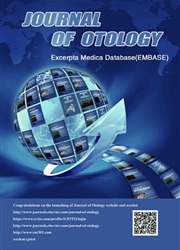

 中文摘要:
中文摘要:
目的 采取1Hz低频重复经颅磁刺激(r TMS)治疗慢性主观性耳鸣并评价其治疗效果。方法 对慢性主观性耳鸣患者46例行1Hz低频r TMS连续治疗2周,治疗前后分别行耳鸣残疾量表评分(THI)评分及主观疗效评估。结果r TMS对耳鸣治疗有明显效果,对主观耳鸣症状总体有效率为63.1%,其中失代偿性耳鸣(THI≥40)的有效率明显高于代偿性耳鸣(THI〈40)(77%vs 45%;P〈0.001),耳鸣患者治疗前后THI为(51.8±23.5 vs 37.0±18.8;t=5.94,p〈0.001),VAS为(6.3±2.4 vs 4.9±1.8;t=5.27,p〈0.01),治疗前后有统计学差异。失代偿组与代偿组耳鸣r TMS治疗后THI变化存在显著差异,两组差值为19.4±8.5(df=42,T=4.95,P〈0.001)。结论 r TMS治疗耳鸣有效,可明显降低THI得分,改善耳鸣症状,特别在失代偿性耳鸣效果更明显。
 英文摘要:
英文摘要:
Objective Evaluate the therapeutic effect of 1-Hz repetitive transcranial magnetic stimulation (rTMS) on tinnitus. Methods 46 chronic tinnitus patients were treated with repetitive transcranial magnetic stimulation for two weeks and the therapeutic effects were assessed afterward. Results rTMS treatment could improve tinnitus obviously. The overall effective rate is 63.1% in subjective tinnitus, The effective rate is higher in decompensated tinnitus(THI ~〉40) than compensatot-y tinnitus (THI〈40) (77% vs 45%; P〈0.001), The THI score of tinnitus patients before and after treatment were r 51.8 ±23.5 and 37 ±18.8; espectively 0=5.94, p〈0.001), VAS were 6.3±2.4 and 4.9 ± 1.8;(t=5.27, p〈0.01.) The difference of the changes of THI between decompensated tinnitus and compensated tinnitus group after rTMS treatment was 19.4 ± 8.5 (df=42, T =4.95, P 〈 0.001). Conclusions rTMS could improve tinnitus, especially for decompensated tinnitus patients.
 同期刊论文项目
同期刊论文项目
 同项目期刊论文
同项目期刊论文
 期刊信息
期刊信息
